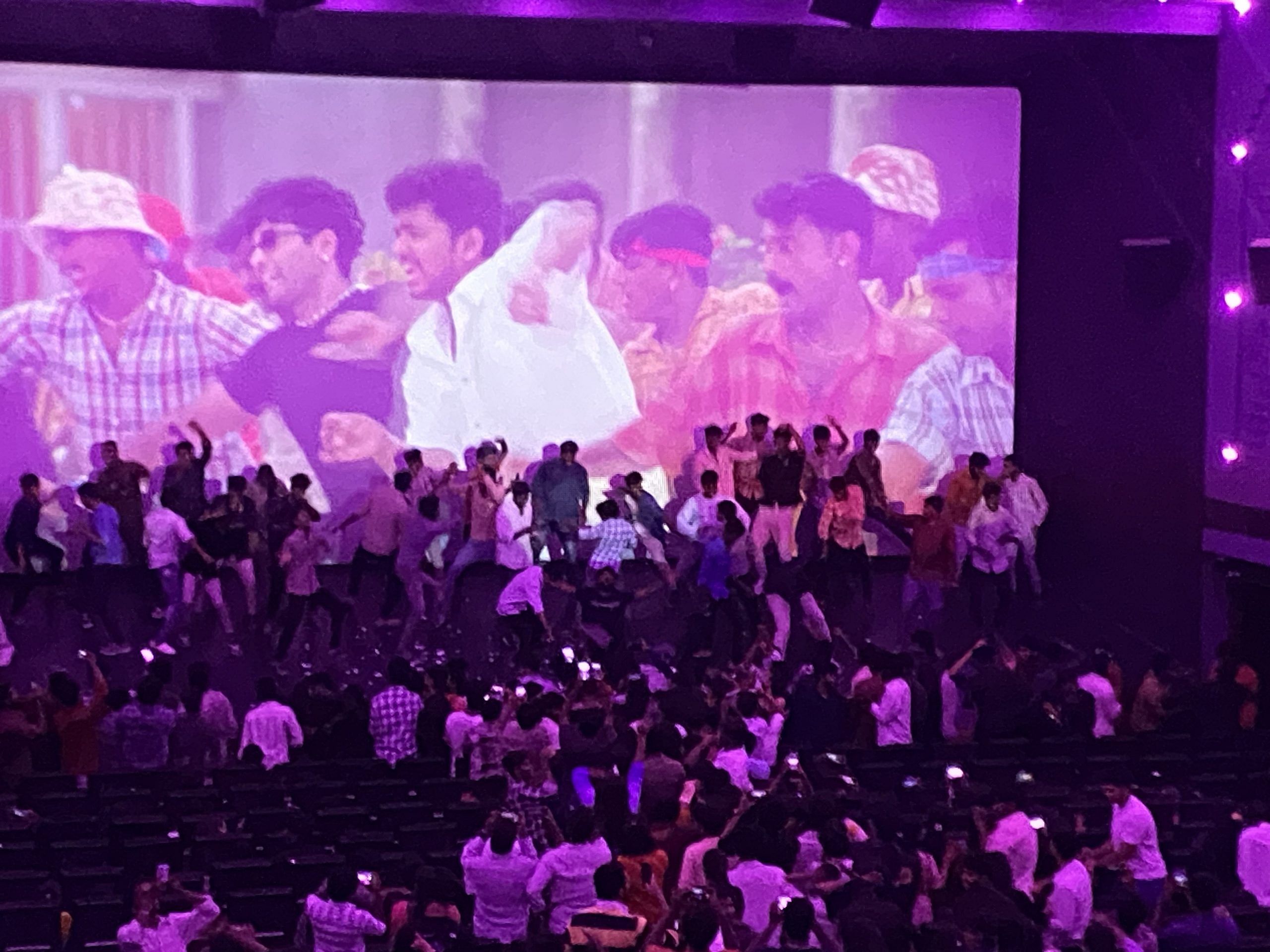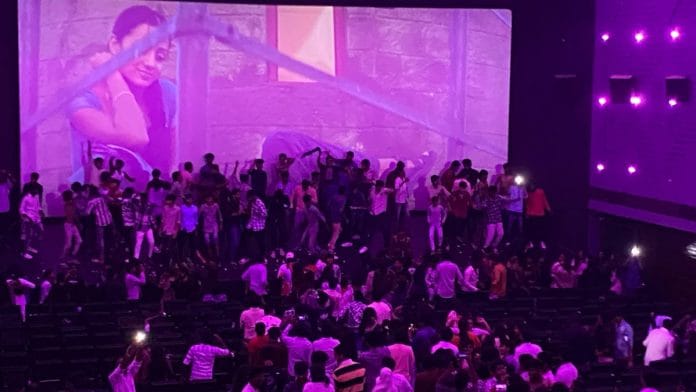Chennai: No big star’s new movie is slated for release in Chennai this election summer. But hundreds of young men and women, mostly millennials and Gen Z, are still flocking to the theatres in Tamil Nadu.
They follow all the trademark rituals of Tamil movie-watching.
From dancing to the bands to placing towering cutouts of the actor, the celebration was much like the first-day-first-show of a new movie release. Except it was a 20-year-old film–Ghilli (2004).
This cinema fever can’t be attributed to the end of voting in Tamil Nadu for the Lok Sabha election on 19 April. In the state’s cinema halls, it is literally yesterday once more. Young people are watching old movies without their parents and relatives — and that is giving them a new freedom to adore the stars in their own youthful way.
Dhanush’s Moonu or 3 (2012), Rajinikanth’s Baba (2002) and Muthu (1995), Kamal Haasan’s Aalavandhan (2001) and Vettaiyaadu Vilaiyaadu (2006), Surya’s Vaaranam Aayiram (2008), and Silambarasan TR’s Vallavan (2006) are among the movies that have been re-released in the state since December 2023.

New trend of old films
As one enters the Kamala Cinemas in Vadapalani, Chennai, men and women scream and celebrate when the movie’s title card is displayed. The theatre erupts again when actor Vijay’s name comes on the screen.
The re-release of Thalapathy Vijay and Trisha Krishnan’s Ghilli on its 20th anniversary is said to have broken all box office records of 2024, collecting around Rs 20 crore in just nine days, says Sakthivel, distributor of the film. Entertainment industry tracker Ramesh Bala said that Ghilli‘s re-release has collected about Rs 30 crore worldwide.
As of late, at least 10 movies have been re-released in Tamil Nadu. Most, however, did not perform as well as Ghilli, collecting less than Rs 5 crore “since they were released only in Chennai,” Bala added.
“We first started to re-release as there were no new movies, but now, even when we have new movies, the old films are gaining more traction,” said Vishnu Kamal, managing director of Kamala Cinemas–the theatre that started the trend of re-releases in Chennai last year. “If not in terms of box office collection, at least in terms of the reception it (Ghilli) was well received by the audience,” he added.
Also read: What changed Madras to Chennai? Pink buses, Periyar, Pa. Ranjith
Once more, once more
Among various reasons to watch the movie, young people, mostly born in the 1990s and 2000s, share that they could connect to the movie better now than when it was first released.
“When Ghilli was released, I must have been in Class 4 or 5. It’s not that I have not watched the movie at all. But watching it in theatres with this sound effect and celebration gives a different vibe,” said Kamali Dayalan, a 27-year-old dentist.
Ghilli‘s distributor shared similar views on the re-release. “We are happy about people coming to the theatres. But, more than the money it collected, you should have seen how people celebrate Vijay sir in the theatre. It is more about celebration than the money,” Sakthivel said.
Vijay, who has floated his own political party Tamizhaga Vetri Kazhagam, has announced that he would stop making movies after finishing the projects he has already accepted. “We have requested him to continue acting,” added Sakthivel.
Dayalan’s reasons for re-watching old films in theatres are freedom and privacy.
“Not all movies are for celebration. For example, Jiiva’s Siva Manasula Sakthi (SMS) released in 2009 was a romance and comedy movie. Similarly, Surya’s Vaaranam Aayiram was also a romantic movie. Even though these movies were telecast on TV, we could not enjoy them in their full essence as we used to watch them with our parents,” shared Dayalan.
Megha, a political science student, said that she is able to enjoy a movie better when nobody is judging her for watching it.
“Now we are accompanied by our friends and colleagues. Even if we are a fan of an actor and even if we say I need my man to be like this, nobody is going to question me. But, we cannot imagine saying something like that at home. Forget all these, I don’t know if I can dance at home in front of my parents,” she said.
At Kamala Cinemas, the number of women in the crowd outnumbered the men. While there were three or four groups of men, women occupied several rows in the theatre.
Megha added that her parents had banned her from watching Silambarasan TR’s movies on TV. “There was a French kiss scene in only one of Simbu’s movies. It was even removed in the TV version. Despite that, I was banned from watching any of his films.”
So, when Vinnaithaandi Varuvaayaa was re-released, Megha was the first person to reach the theatre with her group. They waited for an hour before the screening time.
Whenever a song came on, the theatre turned into a musical concert, with the owner turning on the DJ lights and the audience shooting the song scene for their Instagram reels and stories.
After every song, the crowd unanimously asked to play it “once more”. While all the songs were played twice, the audience wanted Ghilli’s ‘Appadi Podu’ song to be played three times.
Theatres in Chennai engaged with cinema lovers by fulfilling their demands to repeat the songs and even muting the sound at times, allowing the crowd to shout out the lyrics.
Kamal takes the responsibility of hosting this party at Kamala Cinemas. Often, he comes out of the operator’s room to ask the crowd if they are satisfied or if they want a song to be repeated.
Also read: ‘Jal Tu Jalaal Tu’ not an aspirational film about workers—it celebrates their laughter, humanity
New culture of re-releases
Theatre owners in Tamil Nadu are overwhelmed with the new phenomenon of re-released movies pulling huge crowds.
“I have been in this field for over three decades. I have never seen a crowd turning up for 10, 20-year-old movies. And, first of all, we don’t re-release the movies as such. Until we get a new movie, the old one runs in the theatre. Now, even for a newly released movie, only one screen was given and the re-released Ghilli occupied the rest of the five screens,” said R Panneerselvam, owner of Rohini Silver Screens in Chennai. Ghilli ran housefull shows for 10 days at the Rohini Silver Screens.
Kamal was equally shocked by the crowd’s response.
“There were no new movies. So, we thought of releasing 3 of Dhanush sir. We asked him and he was sceptical about its re-release since it was not a commercial success at the time of its release. But, to everyone’s shock, the movie was well received by the people,” he said.
Siva Subramanian, a 69-year-old film historian, said that the idea of re-releasing movies existed even before Independence.
“Even in black and white days, movies were re-released. For instance, TR Rajakumari’s first movie Kumara Kulothungan was released in 1939 and then in 1942. Similarly, a lot of Malayalam movies were re-released by adding certain scenes. The idea is not new,” Subramanian said.
What was interesting to Subramanian was that movies now being celebrated were once rejected by the same theatres.
“The reason Kumara Kulothungan was re-released was that it was a debut movie for Rajakumari and the movie did not do well in theatres. Rajakumari’s second movie Kacha Devayani was a super hit. So, the movie’s producers thought that her first movie would now run successfully since people identified Rajakumari. However, even in the re-release, the movie did not do well,” Subramanian added.
(Edited by Ratan Priya)






